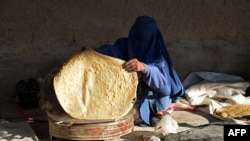Zuhal Akbari has opened a new pastry factory in the western Afghan city of Herat, recruiting women “so that they can do something for themselves, their families and their health.”
Akbari told VOA that most of the 11 women who work with her are university graduates who lost their jobs after the Taliban’s return to power in Afghanistan in 2021.
Under the Taliban, women are barred from working in the public sector and for NGOs, getting a secondary and university education, traveling long distances without male relatives, and going to parks, public baths and gyms.
Although the Taliban said that they have no problem with women working in the private sector, they have imposed restrictions on certain businesses, such as beauty salons.
Last year, the Taliban closed beauty salons that employed tens of thousands of women.
“Many women are coming to us for jobs, but we cannot hire more,” said Akbari, adding that she does not have the resources.
A U.N. Development Program report released last week stated that despite challenges, women-run businesses “emerged as a lifeline” for women in Afghanistan.
Based on a survey of some 3,100 women-led businesses, the report said that “66% of respondents reported an increase in business activities.
“You see the thriving push forward of these women moving more and more into the commerce trade area,” said Kanni Wignaraja, assistant secretary-general, assistant administrator and director of the regional bureau for Asia and the Pacific.
Multiple challenges
Wignaraja, however, told VOA that women-led businesses face multiple challenges.
“The first is affordable capital. The second is modern new skills.... And the third is mobility. The ability to physically move around, follow the markets, particularly cross-border and outside Afghanistan.
Salma Yusufzai, CEO of the Afghanistan Women’s Chamber of Commerce and Industries told VOA that the number of women in business has increased from two years ago when the Taliban seized power when many women-led businesses closed.
“There are more than 9,126 registered women [business owners with the AWCCI] and in total there are 120,000 [registered and unregistered] women-led businesses active in Afghanistan,” Yusufzai said.
She said women-led businesses are “mainly in the areas of carpet weaving, making clothes, jewelry, fruit processing and other areas in agriculture.”
Yusufzai said that one of the major problems for businesswomen in Afghanistan is the “lack of a market” for their products as they do not have access to foreign markets.
“There are no exports to the market outside the country, and no country is granting visas to Afghan businesswomen,” Yusufzai said.
She said that women-led businesses, if supported, have the potential to recruit more women because they are banned from working in other sectors.
No other options
Because women in Afghanistan are deprived of their basic rights under the Taliban, their mental health has deteriorated as they are confined to their homes.
Adela Ghafari, a resident of Herat City, had to stay home for more than a year until she found a job in a local pastry factory.
She graduated from a university with a degree in history. She wanted to be a history teacher or work for the government.
“After I graduated, I wanted to get a job as a history teacher or a government employee,” said Ghafari, “But I cannot.”
“Now I have no other option but to work here,” said Ghafari, adding “but, I have to say it is better than doing nothing at home.”
Zabihullah Ghazi and Fawzia Ahsan contributed to this report.










